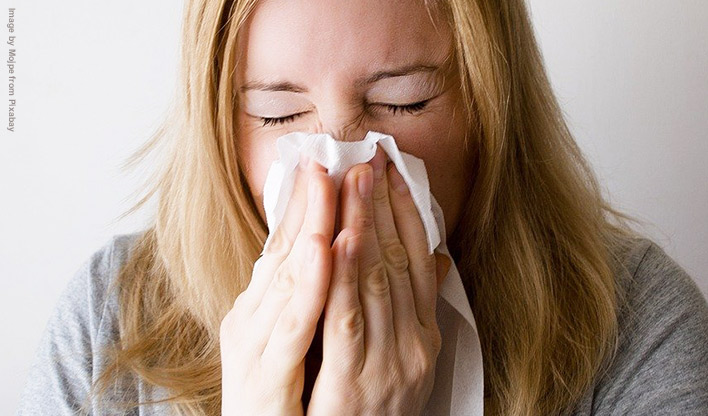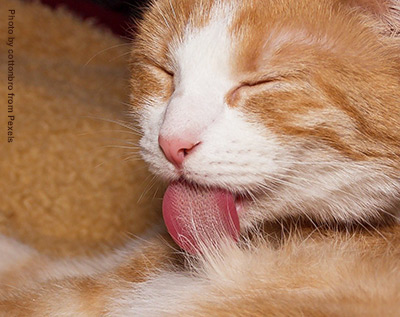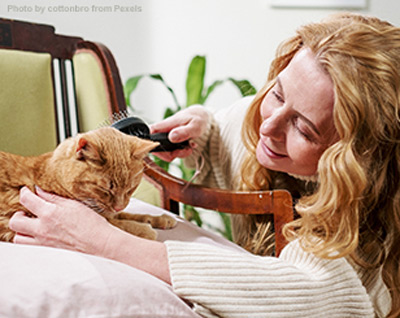Say goodbye to sneezing, wheezing and itching... not to your cat!
If you develop an allergy to your feline family member, take positive action. Find out how to soothe your symptoms and keep your cat! Top tips for allergy sufferers...

A cat allergy doesn’t have to mean giving up your cat!
It’s every cat owner's worst nightmare - you develop an allergy to your cat and perhaps consider rehoming them. An allergy to cats can develop at any time in your life, but there are ways you can alleviate allergy symptoms and potentially keep your cat.
What causes cat allergies?
 While most people believe it is the cat's hair that they are allergic to, it is actually proteins in their saliva, oil glands, urine and dander (dried skin). Each time your cat grooms they spread these proteins on their fur, which are then shed around the home.
While most people believe it is the cat's hair that they are allergic to, it is actually proteins in their saliva, oil glands, urine and dander (dried skin). Each time your cat grooms they spread these proteins on their fur, which are then shed around the home.
People with allergies have oversensitive immune systems which attack harmless things such as pollen and animal dander - causing an allergic reaction.
Some people may develop allergic symptoms when living with a cat for the first time, but find that after a few weeks their symptoms subside or disappear, once their system gets used to contact with the particles of allergen.
How to tell if you are allergic to cats
A cat allergy can be hard to diagnose, and often you may have a different type of allergy such as hay fever or a reaction to dust mites. Some of the common symptoms of an allergy to cats are:
● sneezing
● itchy skin
● watering eyes
● coughing
● wheezing
● breathing difficulties
● eczema flare up
● skin rash or hives
If you suspect you may be allergic to cats you should contact your doctor so that they can investigate your symptoms and suggest possible treatments.
If your symptoms are asthmatic in nature, consider whether they are being brought on by the cat litter you are using, rather than the cat. Changing to a dust free litter may reduce, or in some cases alleviate symptoms entirely.
What to do if you develop a cat allergy
 Speak to your GP
Speak to your GP
If you or anyone in your family has developed an allergy to cats there are some things you can do to help. Firstly, you should speak to your GP about treatments. Antihistamines and nasal sprays can alleviate the symptoms of your allergy, but it may take time to find the treatment that works best for you.
Regular grooming
Grooming your cat regularly (at least once a day if possible) will help to remove any dust or pollen that may be lingering in their fur. It also reduces the amount of loose fur being shed around your home. Ideally, you should brush your cat outdoors, or in a designated grooming area indoors, somewhere that's not often used.
Flea Control
Fleas can cause cats to scratch and lick excessively, increasing the amount of allergens produced. Avoid this by making sure your cats and their bedding are treated regularly for fleas. See International Cat Care - Fleas and flea control in cats for more advice on this.
Cat-free zones
It's a good idea to create cat-free zones within your home so that you have a space you can spend time without risk of a reaction. A good choice for a cat-free zone would be your bedroom, to ensure you have an untroubled night's sleep. Opening windows for extra ventilation can also help, or consider an air purification appliance.
Personal hygiene
It might be tough, but try to avoid letting your cat lick you - as the proteins that cause cat allergies are found in their saliva so letting them lick you could make your symptoms worse. Also make sure to wash your hands thoroughly after fussing your cat.
House cleaning
Keeping your house clean, including vacuuming regularly, will ensure that you do not have a build up of fur and dander, and can help to avoid further reactions. After vacuuming it can help to wipe a damp cloth over the carpet, and even over the cat! Replacing carpet with solid flooring such as laminate or tiles, and fitting solid blinds instead of curtains can help to avoid any build up of allergens in the home. Regularly washing your cat’s bedding will also help.
Anti-allergen cleanser
There is an anti-allergen pet cleanser you can buy called PetAlCleanse. Approved by Allergy UK, it neutralises the allergens. PetAlCleanse is available online, or from major chemists such at Boots, pet supply shops and some larger supermarkets.
Dairy products
Some people find their allergic reaction is lessened by reducing or removing dairy products from their diet, (which reduces the amount of histamines the body produces), perhaps by switching to goats milk or a plant based milk such as soya or oat milk.
Cats Protection - Cat allergy tips
We hope some of these tips will help you to adapt if a member of your household has developed an allergy to cats. No cat owner takes the decision to rehome their cat lightly, but if you feel there is no alternative but to rehome your cat, please visit our advice page: Successfully Rehoming Your Cat.
Further Information
Allergy UK - Cat allergy
Cats Protection - Cats and allergies
Biolife - Products For Allergy Sufferers
Contributor: Ella Street, Cat Chat Blogger
Published: January 2022

